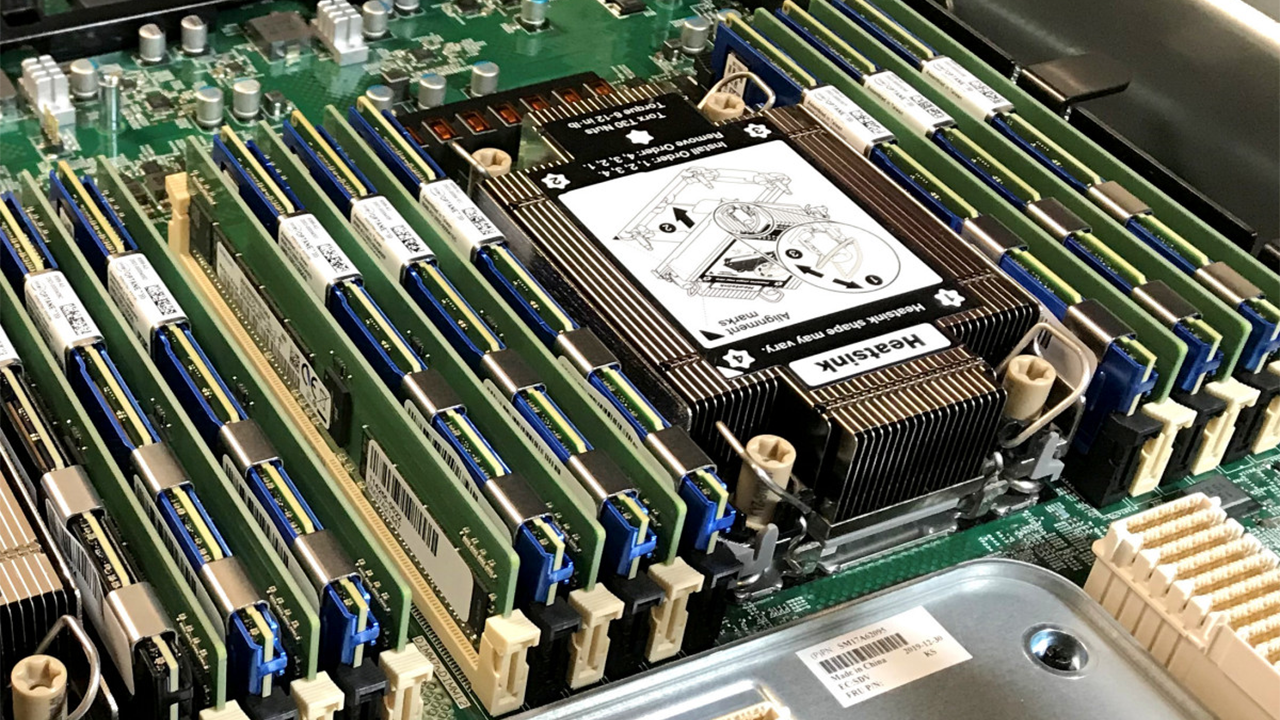Intel Drops Optane Persistent Memory Support From Emerald Rapids
RIP, Optane Persistent Memory

Intel's next-generation Xeon Scalable processors (codenamed: Emerald Rapids) and their successors will cease support of the company's Optane Persistent Memory (PMem) modules, according to the company's own PerfMon tool, as discovered by InstLatX64. Apparently, Intel is now betting on CXL 2.0 memory expansion modules.
Intel's Emerald Rapids heavily relies on technologies developed for Sapphire Rapids, as it uses the same high-performance microarchitecture and shares the platform. That said, removing Optane Persistent Memory support looks to be a business, rather than a technological, decision. Keeping in mind that Intel will stop officially supplying Optane Persistent Memory modules on Dec. 29, 2023, it is logical not to support it on products that ramp in 2024.
The decision to drop support for Optane Persistent Memory modules from the 5th Generation Xeon Scalable processors is not unexpected — in fact, it makes perfect sense. Intel's Emerald Rapids processor is set to support CXL 2.0 type 1, type 2, and type 3 devices — including CXL Attached Memory, which is the direct successor of Intel's Optane Persistent Memory modules. Furthermore, EMR CPUs support the same CXL Attached Memory modes as do SPR processors with Optane PMems, probably because Intel uses the same controller IP. Yet, it hardly wants to validate its outgoing product line with all-new CPUs and hopes to sell its written off Optane inventory in the coming quarters.
Formally, Intel's Emerald Rapids and subsequent generations of Xeon processors will continue to support Optane solid-state drives as they use industry-standard interfaces and can be plugged into new machines seamlessly. That said, we are not sure how many vendors will validate their work with newer datacenter/workstation platforms, so we have little chances to see many future Xeon-based machines outfitted with Optane SSDs.
Anyway, with Intel axing support for Optane Persistent Memory products in its 5th Generation Xeon Emerald Rapids processors, we can once again bid adieu to the technology and welcome upcoming products with CXL support.
Get Tom's Hardware's best news and in-depth reviews, straight to your inbox.

Anton Shilov is a contributing writer at Tom’s Hardware. Over the past couple of decades, he has covered everything from CPUs and GPUs to supercomputers and from modern process technologies and latest fab tools to high-tech industry trends.
-
Li Ken-un Look on the bright side: enterprises will be dumping lots of cheap Optane memory modules for low prices on eBay. Should you be running a pre-Emerald Rapids system, it’s a cheap upgrade to obscene amounts of “RAM.”Reply -
Kamen Rider Blade Reply
I already bought my share of Optane SSD's, enough to last me a life time.Li Ken-un said:Look on the bright side: enterprises will be dumping lots of cheap Optane memory modules for low prices on eBay. Should you be running a pre-Emerald Rapids system, it’s a cheap upgrade to obscene amounts of “RAM.” -
Li Ken-un Reply
Oh no, not that slow stuff. I meant the DIMM form factor Optanes.Kamen Rider Blade said:I already bought my share of Optane SSD's, enough to last me a life time.
But that’s quite an understatement; they might outlive you. 😂 -
Amdlova Love my 900p :) I have two 2933 128gb optane here... but now I have a slow desktop cpu... I want some new xeon machine in the future.Reply -
edzieba I hope we see a 'DIMM-drive' equivalent for Optane DIMMs - like were available for RAM sticks - at some point. Optane itself still has better mixed random read/write performance than even recent NVMe SSDs, and a pile of cheap surplus Optane DIMMs in a carrier would make for a very potent drive for all workloads other than serial large-file copying.Reply -
Kamen Rider Blade Reply
That's the idea, I want "Ultra-Low Latency" that Optane SSD's offer, sadly regular NAND Flash can't provide due to it's inherent design.Li Ken-un said:Oh no, not that slow stuff. I meant the DIMM form factor Optanes.
But that’s quite an understatement; they might outlive you.